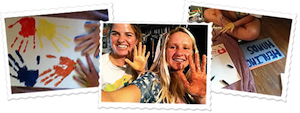 We live in a world of “haves” and “have nots”, a world where political philosophies debate “giving a man a fish to eat for a day” or “teaching a man to fish to eat for a lifetime”, a world where more than 3.4 million people die each year from water, sanitation, and hygiene-related causes. Nearly all deaths, 99 percent, occur in the developing world. Now this may sound a bit heavy for a technology blog, but it brings up a point near and dear to my heart: business should do more than just business. Business should also consciously collaborate with their community to build a better world.
We live in a world of “haves” and “have nots”, a world where political philosophies debate “giving a man a fish to eat for a day” or “teaching a man to fish to eat for a lifetime”, a world where more than 3.4 million people die each year from water, sanitation, and hygiene-related causes. Nearly all deaths, 99 percent, occur in the developing world. Now this may sound a bit heavy for a technology blog, but it brings up a point near and dear to my heart: business should do more than just business. Business should also consciously collaborate with their community to build a better world.
Marc Benioff, CEO of Salesforce.com, has set the gold standard for this with his foundation and 1/1/1 mission:
“The Salesforce.com Foundation is based on a simple idea: Leverage salesforce.com’s people, technology and resources to build collective knowledge and enable action to improve communities throughout the world. We call our integrated philanthropic approach the 1/1/1 model.”
Mr. Benioff has a simple, but powerful, vision for the Foundation—donate 1% of salesforce.com equity, 1% of his employees’ time, and 1% of his product to improving communities around the world. His foundation also shows companies how to implement this for themselves.
Why integrate philanthropy in your business?
- It’s the right thing to do—for your company, your community and our common future.
- It helps you attract and retain skilled employees. Other things being equal, employees who like their company’s philanthropic efforts are five times more likely to stay with their employer.
- It’s good for your reputation and your brand. Study after study finds that people are more likely to buy from and be loyal to companies that have a genuine commitment to their communities—and to look for alternatives to companies with bad reputations.
- It’s good for business in general. Investing in communities stimulates business development, encourages business skills and results in higher consumption.
Still not convinced? Don’t think your organization is big enough to implement this model? Think again. Every little bit can help someone, somewhere. Even as an independent consultant, I have implemented this model and have seen the impact, not only for those I’ve donated to, but for return to my business as well. For me it’s Wisdom Spring and the promise of “Children helping children build community”:
“In 2004 Kristen Karinshak a sophomore from Heritage High school in Leesburg, VA learned that in the villages of Burkina Faso, West Africa, mothers and children have to walk up to 6 hours with heavy jugs on their heads to get water for their families, she decided to take action. At age 15, she co-led her first fundraising event by organizing 15 teenagers to start Walking For Water.”
“Healing Hands was founded in 2011 by Emmy Lombard, a San Clemente High School student, who was called to action after meeting Susan Hough and being touched by the life-changing experiences that the villages of Burkina Faso had given Susan Hough.”
People like Susan Hough, Emmy Lombard and Kristen Karinshak inspire me. They put their words into action and help their peers (other children) in developing countries bring water wells to help their community survive and thrive. This is why I pledge my 1/1/1 to Wisdom Spring and challenge you to do the same.


Recent Comments